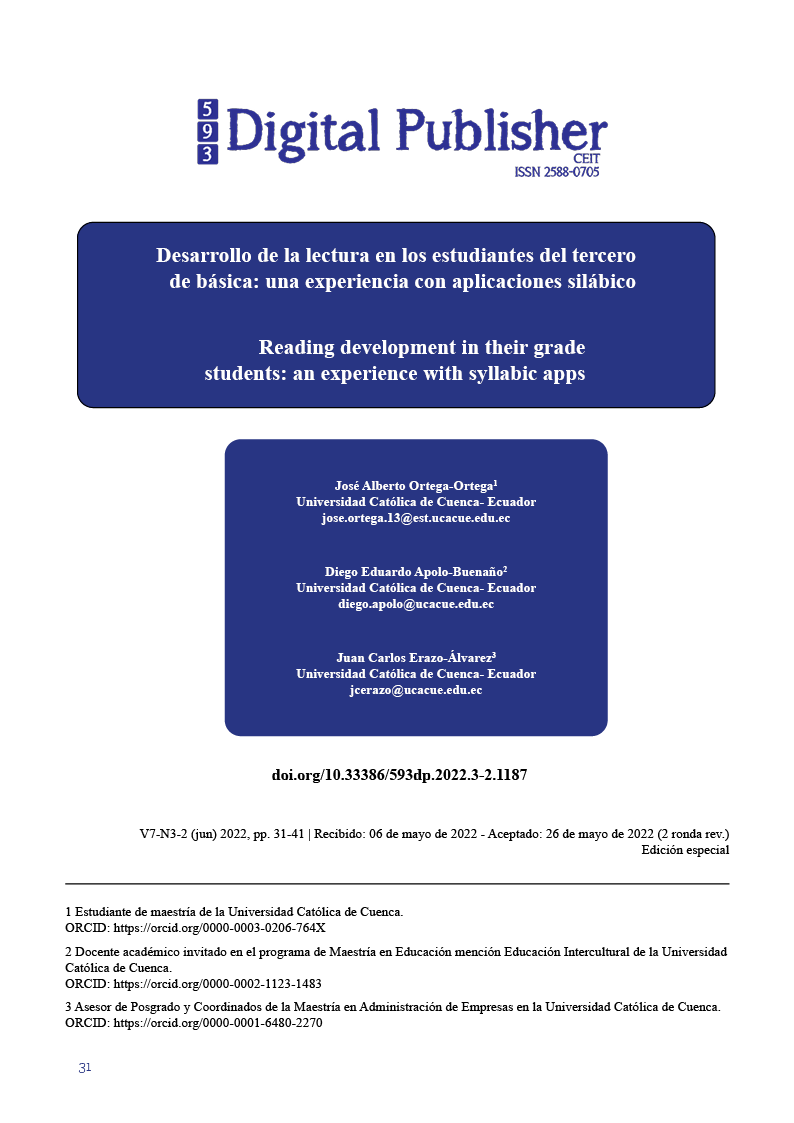Reading development in their grade students: an experience with syllabic apps
Main Article Content
Abstract
In the present work, it will be carried out in the "Leopoldo Cordero Alvarado" EGB school, in the province of Cañar, Azogues canton, Cojitambo parish, in the community of San Jacinto, with third-year students of Basic General Education, for the need to improve reading deficiency, applying the digital and interactive apps "Syllabic", which will encourage users to learn and practice reading in a dynamic and innovative way. Teachers can apply this resource to reinforce the learning of reading, since it achieves greater concentration and improves their reading skills due to its easy-to-handle content and intuitive access, giving educational use to technological devices such as cell phones, tablets or PC. , you can use these applications without the need to connect to an internet network; We have at least one access to a mobile device for each household, so this technological resource should be exploited to the maximum at home with their parents.
Downloads
Article Details

This work is licensed under a Creative Commons Attribution-NonCommercial-ShareAlike 4.0 International License.
1. Derechos de autor
Las obras que se publican en 593 Digital Publisher CEIT están sujetas a los siguientes términos:
1.1. 593 Digital Publisher CEIT, conserva los derechos patrimoniales (copyright) de las obras publicadas, favorece y permite la reutilización de las mismas bajo la licencia Licencia Creative Commons 4.0 de Reconocimiento-NoComercial-CompartirIgual 4.0, por lo cual se pueden copiar, usar, difundir, transmitir y exponer públicamente, siempre que:
1.1.a. Se cite la autoría y fuente original de su publicación (revista, editorial, URL).
1.1.b. No se usen para fines comerciales u onerosos.
1.1.c. Se mencione la existencia y especificaciones de esta licencia de uso.
References
Agudelo, Mauricio; Chomali, Eduardo; Suinaga, J. (2020). La Digitalización En América Latina Frente Al Covid-19[The oppirtunities ofdigitalization in Latin Americaagainst Covid-19]. Cepal Caf Elac, 2–33. https://n9.cl/52i0
Alcántar-Carranza, M. del R., & Caldera-Montes, J. F. (2018). Percepción de los Estudiantes sobre el Aprendizaje Significativo y Estrategias de Enseñanza en el Blended Learning [Perception of students on meaningful learning and teaching strategies in blended learning]. REICE. Revista Iberoamericana Sobre Calidad, Eficacia y Cambio En Educacion, 16(1), 73–88. https://doi.org/10.15366/reice2018.16.1.005
Asamblea Nacional del Ecuador. (2008). Constitución de la Républica del Ecuador[Constitution of the Republic of Ecuador]. Iusrectusecart, 449, 1–219. https://n9.cl/41evj
Baquero-Castellanos, S., Gallo, A. L., & Muller, O. (2019). Evidencia Para Un Efecto Facilitador De La Frecuencia Silábica En La Lectura De Palabras En Escolares Hispanohablantes De 2° Y 5° Grado[Evidence for a facilitatori effect of syllable frequency in words reading from spanish speaking schoolchildren in grade. RLA. Revista de Lingüística Teórica y Aplicada, 57(2), 165–182. https://doi.org/10.4067/s0718-48832019000200165
Calderón-Pujadas, J. F. (2019). Impacto de las nuevas tecnologías en la masificación de la educación[Impact of new technologies on the massification of education]. Skripsi, 5–9. https://n9.cl/8jmat
Cantú Cervantes, Daniel; Lara Guerrero, José Francisco; Lera Mejía, J. A. (2017). Uso de dispositivos móviles para favorecer la motivación durante la lectura en leducaciónprimaria[The use of mobile divicesto motivate reading in elementary education]. Internacional de Ciencias Sociales y Humanidades, 27(1), 49–69. https://n9.cl/zzhil
CEPAL. (2018, December 17). Una mirada regional al acceso y tenencia de tecnologías de la información y comunicaciones – TIC, a partir de los censos | Enfoques | Comisión Económica para América Latina y el Caribe[A regional look at access and possession of information and communicat. Comisión Económica Para América Latina y El Caribe. https://www.cepal.org/es/enfoques/mirada-regional-al-acceso-tenencia-tecnologias-la-informacion-comunicaciones-tic-partir
Gallego-Ortega, J. L., Figueroa-Sepúlveda, S., & Rodríguez-Fuentes, A. (2019). La comprensión lectora de escolares de educación básica[Reading comprehension of basic education students]. Literatura y Lingüística, 40, 187–208. https://doi.org/10.29344/0717621x.40.2066
Gamboa-Suarez, A. A., Montes-Miranda, A. J., & Hernández-Suárez, C. A. (2018). Representaciones de los docentes de educación básica sobre los aportes de las Tecnologías de la Información y la Comunicación en la escuela[Representations of the teachers of basic education on the contributions of Information and communication technologi. Espacios, 39(2). https://n9.cl/e2006
Jiménez-Porta, Ana María, & Diez-Martínez Day, E. (2018). Análisis del contenido de apps y videojuegos: implicaciones en procesos cognitivos en la lectura inicial[Content analysis of apps and video games: Implications in cognitive processes in initial reading]. Apertura, 10(1), 71–87. https://doi.org/10.18381/Ap.v10n1.1114
Ministerio de Educación del Ecuador. (2020). Currículo Priorizado para la Emergencia 2020-2021 Régimen Sierra-Amazonía[Prioritized Curriculum for the Emergency 2020-2021 Sierra-Amazon Regime]. Ministerio de Educación, 1–13. https://n9.cl/8ck6e
Silva-Zavaleta, S. A. (2021). La comprensión lectora y los avances en la educación básica regular[Reading comprehension and advances in regular basic education]. Polo Del Conocimiento, 6(1), 963–977. https://doi.org/10.23857/pc.v6i1.2193
Tizio, H. (2009). Saber Leer, aprender a leer[Knowing how to read, learning how to read]. Educação Em Revista - UFMG, 25(1), 219/227. https://n9.cl/pu4jq
Unesco. (2018). Las competencias digitales son esenciales para el empleo y la inclusión social[Digital skills are essential for employment and social inclusion]. Www.Unesco.Org. https://n9.cl/te11
Vázquez, M. A., Bonilla, W. T., & Acosta, L. Y. (2020). La educación fuera de la escuela en época de pandemia por Covid 19. Experiencias de alumnos y padres de familia[Education outside of school in times of a Covid19 pandemic. Experiences of students and parents]. Revista Electrónica Sobre Cuerpos Académicos y Grupos de Investigación, 7(14), 111–134. https://n9.cl/qo1ad




